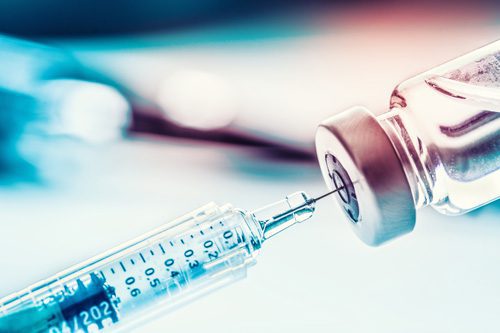When a person has an opioid or alcohol addiction, they are dealing with a chronic brain disease that affects them both physically and psychologically. While various types of therapies and counseling are used to address the psychological aspects of the illness, medication can also play a key role in promoting lasting recovery.
What Is Vivitrol?
Vivitrol, a prescription medication, works by blocking specific receptors in the brain to help prevent relapse after detox. It is important to note that Vivitrol must only be used as part of a complete recovery program for alcohol or opioid addiction.
Vivitrol is an injectable prescription drug that is classified as an opioid antagonist. Its main ingredient is naltrexone. Vivitrol, a non-opioid, works by binding opioid receptors in the brain to block their ability to release endorphins and dopamine. When the receptors are blocked, opioids, such as prescription narcotic painkillers or heroin, will not provide the “high” the user wants.
Vivitrol also reduces cravings for opioids, reducing the risk of relapse. If a person has an addiction to alcohol, the medication works in a similar way both blocking cravings and eliminating the effects felt by the alcohol.
How Is Vivitrol Administered?
When Vivitrol is administered, it is an intramuscular injection given in the buttocks. The injection contains 380mg of the drug and is given once a month. The injection should only be given by a healthcare professional.
Sometimes people that receive Vivitrol injections have severe reactions at the injection site, some of which require surgery. These reactions include:
- Tissue death
- Intense pain
- A large area of swelling
- Lumps, blisters, or an area that feels hard
- An open wound
- A dark scab
It is essential that before beginning Vivitrol injections, the person has been opioid or alcohol free for a minimum of 7 to 14 days to avoid the possibility of sudden withdrawal. This includes the following:
- Prescription pain medications
- Street drugs
- Medications that contain opioids such as cold, cough, or diarrhea medicines
- Opioid-dependence treatments including methadone or buprenorphine
Never take opioids of any kind in any amount after Vivitrol is in your system. It can lead to overdose, coma, respiratory failure, or death.
What Are the Side Effects of Vivitrol?
A strong medication, Vivitrol’s side effects range from mild and non-harmful to extremely serious.
Mild and Non-Harmful Side Effects
Feeling drowsy, developing a rash, having headaches, or feeling dizzy are common side effects of Vivitrol. Other non-harmful side effects include:
- Stomach pain
- Digestives changes, including constipation, diarrhea, nausea, and vomiting
- Mood swings, irritability, or anxiety
- Muscle or joint pain
- An increase or decrease in physical energy
- Difficulty staying or falling asleep
- Loss of appetite and weight
Serious Side Effects
Taking Vivitrol can cause very serious side effects that should be reported to your medical professional immediately. One of these is anhedonia, which is the inability to feel happiness or pleasure from any activity. Experiencing intense feelings of sadness, hopelessness, worthlessness, or helplessness are others.
Additional serious side effects of Vivitrol include:
- Attempting suicide or thinking about committing suicide
- Allergic reaction
- Dehydration caused by severe diarrhea or vomiting
- Eye problems and blurred vision
- Confusion or hallucinations
- Difficulty breathing, such as slow shallow breathing, coughing, or wheezing
- Extreme anxiety or feelings of guilt without reason
Another very serious possible side effect of Vivitrol is liver damage or hepatitis. If you have stomach pain that lasts for more than a few days, have dark urine, are extremely tired, or notice that the whites of your eyes are yellowing, contact your doctor right away.
Who Should Not Take Vivitrol?
People that fall into the following groups should not take Vivitrol:
- Anyone with acute hepatitis or any problems with their liver or kidneys
- People with bleeding problems, including hemophilia or low platelets
- Pregnant women or women that are breastfeeding
Should Vivitrol Be Part of My Treatment Plan?
Vivitrol is not for everyone. It is important to speak to your health care provider and work with medical professionals throughout the detox and rehabilitation process to create a treatment plan that’s right for you.
Vivitrol can help manage cravings, but it is only one part of the overall process of becoming free of your drug or alcohol addiction. By entering a rehabilitation treatment center, you can detox safely and begin to work on all aspects of your recovery.
The residential treatment program at Canyon Vista Recovery Center in Mesa, Arizona uses a variety of evidence-based addiction treatments, psychiatric and medical care, and holistic therapies to help people overcome their addiction and maintain their sobriety. When detox is needed, we work with local treatment providers to ensure that your detoxification process is completed in safe and encouraging environment.











